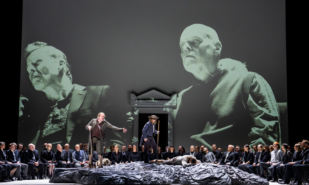Greta Gerwig’s fantasy comedy Barbie was released on Friday July 21. Before to its premiere, the film had already gained the status of the most anticipated movie of the year on the Internet, alongside Oppenheimer, which was planned to be released on the same day as Barbie, which spawned countless memes about their cinematic rivalry called “Barbinheimer”.
What is Barbie actually about?
Numerous jokes on the Internet that a movie about adventures of a child’s toy — a blonde doll dressed head-to-toe in pink — is a more serious motion picture than a film about the creation of the atomic bomb, suddenly turned out to be no joke at all. At the screenings of Barbie viewers laugh out loud, cry, then laugh again, and exit the movie theatres shaken to the core by the ending and the unusual perspective on modern life. So what kind of movie did Greta Gerwig make, what is Barbie really about and why does make even men cry?
To answer these questions we need to start with a brief recap of the plot, so further in the article there may be small spoilers. The main character, the “stereotypical” Barbie (Margot Robbie) with no definite profession or purpose, who walks around in pink and just enjoys life, lives every day identically perfect in her pink “dream house” in Barbieland. Her neighbours — President-Barbie, Doctor-Barbie, Nobel Prize-winning physicist-Barbie, and others — all live the similar perfect life in a world where there is no ageing, no cellulite, and matriarchy prevails.
The Kens in Barbieland can be considered real second-class citizens — they have no home, no real jobs, and their greatest joy is to be noticed by Barbie. Barbieland is also a home to a few “rogue” dolls — Midge, Barbie’s pregnant friend, which was discontinued almost immediately after her introduction; Allan, intended as a best friend for Ken, which was also discontinued after the first series of these dolls in the 1960s; and the “weird” Barbie — the Barbie which was “played with a little bit too hard” and which every girl had as a child.
All the residents of Barbieland live a fun life, with no surprises or problems, and go to parties every day where they dance and sing rehearsed dances and songs. All this continues until, at one of these parties, the Margot Robbie’s character begins to think about death, which is completely inappropriate for a Barbie doll. From that moment on, very strange things start happening to her —her heels touch the ground, her teeth need to be brushed in the morning, and her thighs have cellulite. Barbie finds out that all these problems are caused by the fact that her “owner” in the real world is unhappy and these emotions are transferred to her, and to get back her carefree life Barbie must find her owner and help her to regain happiness again.
Barbie, followed by Ken (Ryan Gosling), travels to the real world where they both encounter a reality completely unfamiliar to them. Barbie learns that the world is not ruled by women, that old age exists, that the “real” men sexually objectify her, and that Barbie dolls themselves have not “destroyed” sexism, but may have very well contributed to it. While Barbie looks for her owner, Ken also explores the real world, during which he learns that, unlike in Barbieland, men here can hold high positions of power, have influence, and can ride horses (which ultimately convinces Ken that patriarchy is good). Ken returns to Barbieland without Barbie to tell the other Kens about what he has seen in the real world and the patriarchy takes over Barbieland.
Barbie, after having found her owner, returns with her to a completely different Barbieland, renamed Kendom (a reference to the word “kingdom”), where all the Barbies have left their lofty positions and are drinking beers with the Kens and listening to their stories about movies and horses. At the end of the movie, Barbie and her owner restore the matriarchy in Barbieland and everything goes back to normal.
If you look at the plot as superficially as it is told in this article, it begins to seem that Barbie is a radical feminist propaganda. And while Greta Gerwig has already established herself in Hollywood as a filmmaker focusing on women’s lives and issues, Barbie, like her previous films, is not at all a story about men hating women and does not actually state that an ideal world that can only exist under absolute power of women.
The perfect Barbieland has its own problems ranging from the complete lack of gender equality and the inability to accept anyone minimally deviant from the accepted norm (all Barbies laugh at the “weird” Barbie to her face and behind her back, and never invite her to parties) to the constant pressure Barbies feel from having to maintain their ideal femininity and successful careers at all times, which is recognised by the Barbie-president during the temporary patriarchy by saying that “sometimes you want to relax”. It is this phrase that explains why patriarchy has so easily found favour not only with the Kens, but with the Barbies themselves.
In Barbie feminism is presented in a completely new light — in Barbieland women are not only not interested in men, they see them as a kind of accessory, created only to please Barbie. They make scientific discoveries, pass laws and have girls nights every night. Men, on the contrary, suffer from undivided love and are capable of experiencing very deep feelings that according to the plot Barbies do not feel. However, as shown throughout the film, Barbies themselves suffer from this and sometimes just want to relax, shed all responsibilities and have a beer with Kens.
The patriarchy established by Ken, who has been to the real world, is also completely inconsistent with the vision of patriarchy often portrayed by the radical feminism movement. This is vividly expressed by the fact that unlike the real world, where a “rude” man slaps Barbie on the butt, the Kens do not start behaving vulgarly or disrespectfully towards Barbies, but simply want to spend time with them, share opinions and play guitar for them. This way, Greta Gerwig seemingly mocks the modern views on conflicts between sexes, showing that in fact men and women are more alike than they seem and equally need each other.
The way of life depicted in Barbieland, which has received certain backlash on the Internet, does not really reveal the advantages of matriarchy, but rather implies that regardless of gender, everyone should have the right to happiness unrelated to another person. It is the conclusion that Ken comes to, gaining the opportunity to live not only for Barbie’s pleasure, but also for himself.
The same idea also occurs to Barbie. Unlike many Hollywood movies, where a female character meets the love of her life, which leads to the ultimate happy ending, she doesn’t find love in someone else in the finale. Based on her experience in the real world, Barbie decides to go back there and start a new life as a real woman. Does this mean that Barbie chooses sexism and patriarchy?
No, Barbie chooses reality because she has grown up. During her journey from Barbieland, she has faced many problems of the modern women, but she has also realised that they are all just a small part of what constitutes the happiness of being a grown woman. Barbie is a movie about growing up. About how a little girl who thinks that she can do anything because there are Barbie dolls of all professions is faced with the cruel realisation that she can only be herself and sometimes that’s enough. She faces this unsightly reality and chooses it anyway.
A lot of attention in the film is paid to the concept of motherhood. In addition to a storyline dealing with the problems in the relationship between Barbie’s owner and her teenage daughter, which is a typical example of a generational problem, the movie features several scenes of Barbie meeting her “mother” – the doll’s creator Ruth Handler (Ann Roth). Named after Handler’s real daughter, Barbie begins to feel the urge to become a real person after conversations with her “mother”. Handler explains that Barbie is her immortal “idea” created to show little girls, who, at the time of Barbie’s creation only had the opportunity to play with baby dolls, that they can be anything they want to be.
Thus when Barbie, created to serve as an example to little girls that they have many other opportunities besides motherhood to prove themselves in society, chooses the real world after conversations with “mother”, shows that the best example she can set, as well as live the best life possible, is only by being a real woman with all the consequent joys and troubles.
Viewers of Barbie go to the cinema expecting a comedy about a brought-to-life doll, and return from watching the movie with endless gratitude to their mothers and a redefined awareness of what it means to be a woman in the 21st century. Barbie is not a movie about the endless benefits of feminism or its downside. Barbie is a movie about growing up, about childhood dreams and their inevitable crash in adulthood. And also about the fact that this crash does not mean the end at all.





